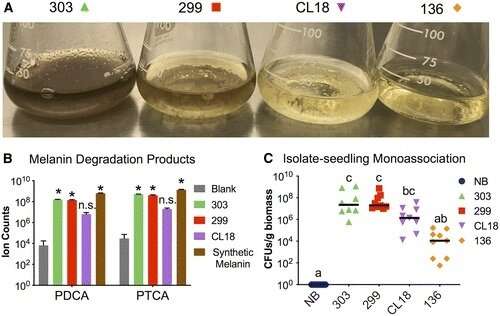Melanin-producing Streptomyces are more likely to colonize plants

Plant growth-promoting Streptomyces assemble into the internal, root endophytic compartments of a wide variety of plants around the world. These bacteria are well-known for their ability to produce a huge array of secondary metabolites and also protect against pests.
Recent research published in Phytobiomes Journal demonstrates that melanin-producing Streptomyces are more likely to colonize plants, which has been shown to be protective for many different organisms.
According to corresponding author Sarah Lebeis, "We show that the ability to produce melanin protects microbes from harmful chemicals they encounter when they live inside of a plant and that it is active when bacteria are inside plants. We believe that our findings provide a protective pathway potentially utilized by a variety of other microbes when they try to grow inside of plants."
Lebeis and her fellow researchers at the University of Tennessee had access to an extensive collection of Streptomyces isolates from Arabidopsis thaliana roots grown in two soils in North Carolina. Upon analysis, they came up with the hypotheses that Streptomyces that produces melanin colonizes plants better. They tested this hypothesis using strains from another collection isolated from Poplar trees mostly on the West Coast but also from Appalachia and found similar results.
"This makes us think that this mechanism is more generalizable between plant-microbe interactions," Lebeis explained. "The soils are very different between the collections, and the potential time required for the association could be very different (6 weeks for Arabidopsis, and potentially years for the Poplar). This make us think that the protection being able to make melanin provides is in response to a strong selective pressure from the plant."
More information: Sarah Stuart Chewning et al, Root-Associated Streptomyces Isolates Harboring melC Genes Demonstrate Enhanced Plant Colonization, Phytobiomes Journal (2019). DOI: 10.1094/PBIOMES-01-19-0005-R
Provided by American Phytopathological Society




















